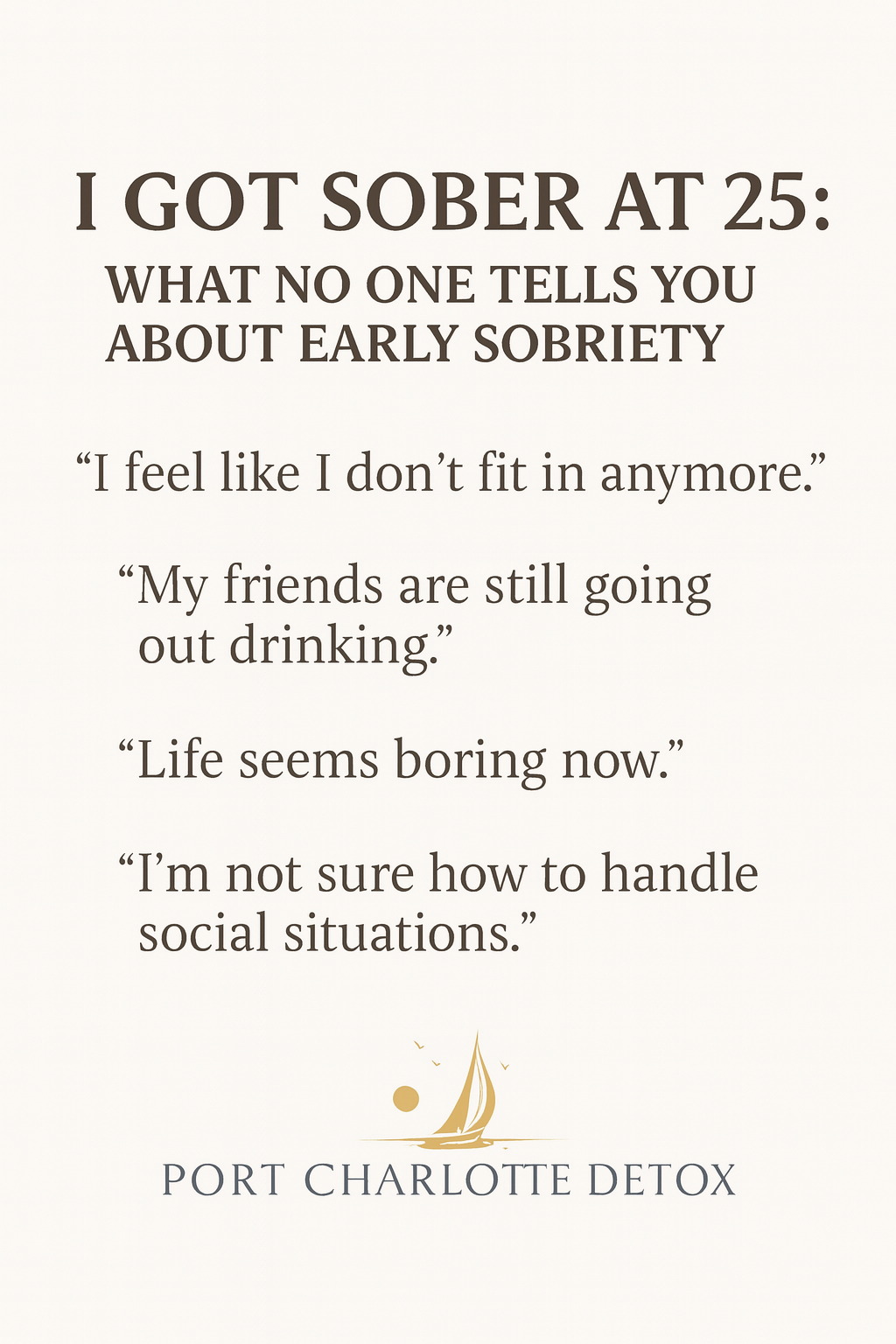Even when you’re proud of yourself for quitting, the quiet can feel brutal. Friends might still be out late. Your phone might stop lighting up as much. That loneliness? It’s real. And while alcohol addiction treatment can help you heal physically and mentally, it’s the day-to-day surprises of early sobriety that no one talks about.
If you’re in Charlotte County or the surrounding area, alcohol addiction treatment in Port Charlotte offers more than medical support—it’s a place to find real connection. Early sobriety isn’t just about not drinking. It’s about rebuilding your life in a world that may still expect you to drink.
Is it normal to feel out of place after getting sober young?
Yes—and it can be intense. At 25, your social circle might still center on bars, clubs, or drinking-heavy gatherings. When you remove alcohol, it can feel like you’re speaking a different language than your peers. You might laugh less at their drunk stories or feel drained by the same late-night conversations.
One client told me, “It felt like everyone else was at the party and I was watching through a window.” That sense of being outside looking in can be hard to shake, but it’s a normal part of adjustment.
How do I handle friends who still drink?
Some friendships can handle the change. Others can’t. You may need to redefine what “hanging out” means—coffee dates, beach walks, game nights instead of last call at the bar.
A young woman in early recovery described it this way:
“I had to stop expecting my old Friday nights to work for me. Once I made peace with that, I stopped feeling so left out.”
If you’re looking for alcohol addiction treatment in Charlotte County, many programs include relapse prevention and social boundary skills—both can help you navigate these moments without losing your sense of belonging.
Will sobriety make me boring?
This is one of the most common fears. In reality, you’re about to discover the kind of fun you actually like—without blackouts or hangovers. You might find you’re more adventurous, more reliable, and more creative without alcohol’s filter.
The first months can feel flat because your brain is recalibrating. Dopamine, the “feel good” chemical, has been overused and needs time to balance. That can make life feel muted for a while, but it’s temporary. Your personality isn’t gone—it’s just under construction.
How do I deal with the loneliness?
You can’t force instant connection, but you can stack the odds in your favor:
- Try sober meetups or local young adult recovery groups.
- Find one or two “safe” friends who understand you’re not drinking.
- Volunteer or join interest-based communities—surfing, art, hiking.
- Make small talk in safe spaces like coffee shops or community centers.
In Port Charlotte, being near the Gulf means options for outdoor, sober-friendly activities are endless. Salt air and movement can be surprisingly healing, and walking by the water can be as much therapy as it is exercise.
What if my family doesn’t get it?
Some families breathe a sigh of relief. Others question why you “had to quit” in the first place. If you’re feeling misunderstood, remember: your sobriety doesn’t need their permission to be valid.
Treatment programs can help you communicate your needs and set boundaries without turning every conversation into a battle. This might include role-playing hard conversations or learning “exit lines” to avoid conflict.
Is treatment worth it if I’m already sober?
Absolutely. Medical detox is just the start—ongoing therapy, group work, and skill-building can keep you from sliding back into old patterns. Even if you’ve been dry for weeks or months, treatment can help you create a life you don’t want to escape from.
If you’re near Fort Myers, you can also explore alcohol addiction treatment in Fort Myers, FL, which offers similar resources with a different local community feel.
FAQ: Getting Sober Young
What’s the hardest part about getting sober at 25?
Most people expect the cravings to be the toughest challenge, but many young adults say it’s the social disconnect. You might miss the camaraderie of late-night drinking, even if you don’t miss the drinking itself.
Will I lose all my friends if I stop drinking?
Not all of them—but some relationships will change. The friends who value you beyond drinking will stick. The ones who only knew the party version of you may fade, and while that hurts, it also makes space for healthier connections.
Can I ever go to bars again?
Eventually, yes—if it feels safe for you. Some young adults in recovery find they can attend social events without drinking once they’re stable in sobriety. Others avoid those settings entirely. There’s no one “right” approach.
What if I relapse?
A relapse doesn’t erase your progress, but it’s a sign you need more support. Many treatment centers in Southwest Florida can help you return to recovery without judgment.
How do I explain my sobriety without oversharing?
Keep it short: “I’m not drinking right now.” You don’t owe anyone your full story unless you want to share it. Treatment can help you practice setting these boundaries.
Is it weird to feel grief over alcohol?
Not at all. Alcohol may have been your coping tool, social lubricant, or identity marker. Letting go can feel like a loss, and grief is part of healing.
Final Thought: You’re Not Broken
If you’re reading this and feeling like you’re the only young person who isn’t drinking, I want you to know—you’re not broken. You’re just in the middle of building something new, and that in-between space can feel empty before it feels full.
Call (844)336-2690 or visit our alcohol addiction treatment services in Port Charlotte, Florida to learn how we can help you feel less alone in your recovery.



